Keweenaw Now published a blog post written by Kendra Lachik ‘23 (environmental engineering) about presentations given by Michigan Tech’s delegation to the COP27 climate conference, held in November in Sharm El-Sheikh, Egypt. MTU students Anna Kavanaugh (environmental engineering, sustainability science and society), Rose Daily (environmental engineering) and Alexis Pascaris (environmental and energy policy) were quoted in the article about their experiences at the conferences.
Eugene Brown Agyei
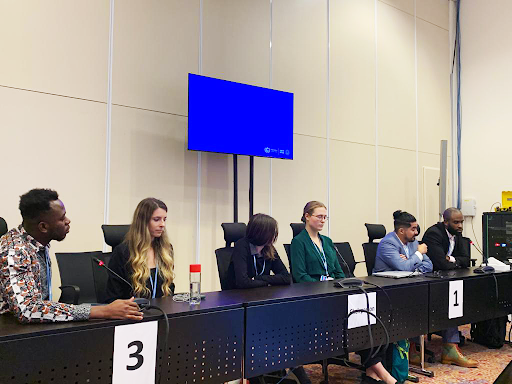
“Alright. Get ready. We go live shortly!” Those are the words I would usually say or text on the MTU COP27 Whatsapp group page minutes before a class on campus joined us to learn about our experiences at the United Nations Conference of the Parties (COP27) in Sharm el-Sheikh, Egypt. This came after many hours of preparation by the MTU delegation which included booking meeting rooms, setting up cameras, and putting our notes together. If you met us within this period, you’d think we were running a mini newsroom. My past experience working in the media had prepared me for things like this.
Since Michigan Tech was granted observer status to the conference in 2019, the delegation has always endeavored to share their experiences live from the conference grounds with students offering related courses on campus. This year was no different, except that we went beyond the usual Zoom sessions with students sharing their experiences turn by turn. We wanted them to virtually feel the conference environment, enjoying the ambiance, the chaos, and the massive crowds right in their classroom in Houghton.
COP27 took place from November 6th to November 18th, 2022. The Michigan Tech student delegation went in two groups. The first group which participated in the activities of the first week included me, Rose Daily (Civil, Environmental, and Geospatial Engineering), Kendra Lachick (Social Sciences), Anna Kavanaugh (Social Sciences), and Alexis Pascaris (Social Sciences). Ayush Chutani (Mechanical Engineering-Engineering Mechanics), Katherine Huerta Sanchez (Social Sciences), Aritra Chakrabarty (Social Sciences), and Shardul Tiwari (Social Sciences),
The first day of our Life from COP experience did not go exactly as planned. Even though we had a nice setup and ambitious ideas, technology had its own plans. However, we were able to share our experiences with one class on campus and answer questions they had sent to us before our interaction.
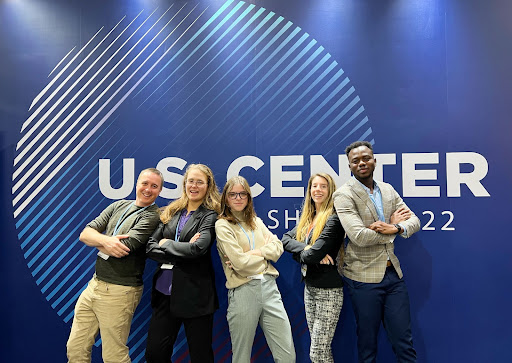
On the second day, we added a little bit of innovation and positioned ourselves at different points at the venue. This gave us indoor and outdoor experiences while interacting with students. For my colleagues who were new to anything journalism, that would be their first experience as student reporters. We shared scenes of what was happening on the grounds from different areas and gave them a brief of events and sessions that we had individually been part of. The exciting part was that we received an invitation to a keynote speech by President Joe Biden on that day. We shared snippets of the prelude to the event also.
Students on campus in turn had several interesting questions about which countries were making waves at the conference and what their priorities were. We shared with them ideas, initiatives, and proposals for addressing climate change as well as which of them we thought were the most realistic and most likely to win support from more than one group. We talked about China, and Egypt as the host, the venue and facilities as well as our surprises. There are always surprises at COP.
Before the Live from COP, and after it, students from Michigan Tech and others from six universities in the United States and other countries who formed the Youth Environmental Alliance in Higher Education (YEAH) network hosted press conferences and panel discussions on climate education, youth climate actions, and storytelling among others. We also participated in events that were of interest to us or related to our areas of study. All of these were beside the exhibition that we mounted at the US Center. The display highlighted what climate action meant to young people like us.
Being part of such a global conversation on an important topic as climate change is an experience of a lifetime. We formed connections with different people from different parts of the world that will last a lifetime, made great impressions highlighting our training at Tech, and saw a different part of the world. Beyond this momentous experience, the commitment of Tech students toward a sustainable world is proof of Michigan Tech’s commitment to preparing students for the future.
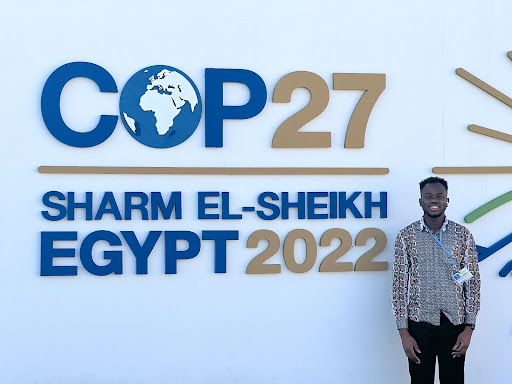
This post was written by Eugene Brown Agyei, who is attending COP 27 as part of a delegation led by Sarah Green and the Youth Environmental Alliance in Higher Education (YEAH) Network. YEAH is a transdisciplinary, multi-institutional network that equips students with real-world experience in collaborative, evidence-based approaches to global environmental sustainability. Eugene is among more than 35,000 attendees at the 27th Conference of the Parties to the United Nations Framework Convention on Climate Change (UNFCCC COP27). The annual summit is the largest climate-change-focused event in the world. He is a Rhetoric, Theory, and Culture graduate student at Michigan Technological University.
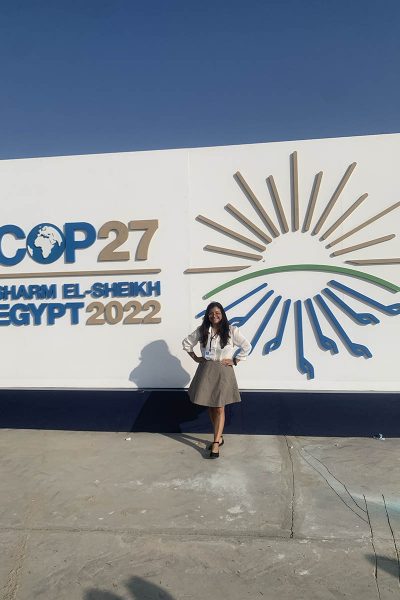
Once at the conference, I most look forward to attending and listening in on indigenous perspectives on climate policy and action. Learning from these perspectives and ideas is important because they carry generations of knowledge that have historically been ignored by global leaders. So we should start to consider their valuable input.
I want to attend the conference because climate change is a topic that weighs heavily on my interests and research. By attending I can learn more about the delegations, policies, conversations, and science involved in the topic. I hope that by being an active participant in these matters I can become better educated and hopefully do more to influence my peers/generation about the pressing nature of climate change.
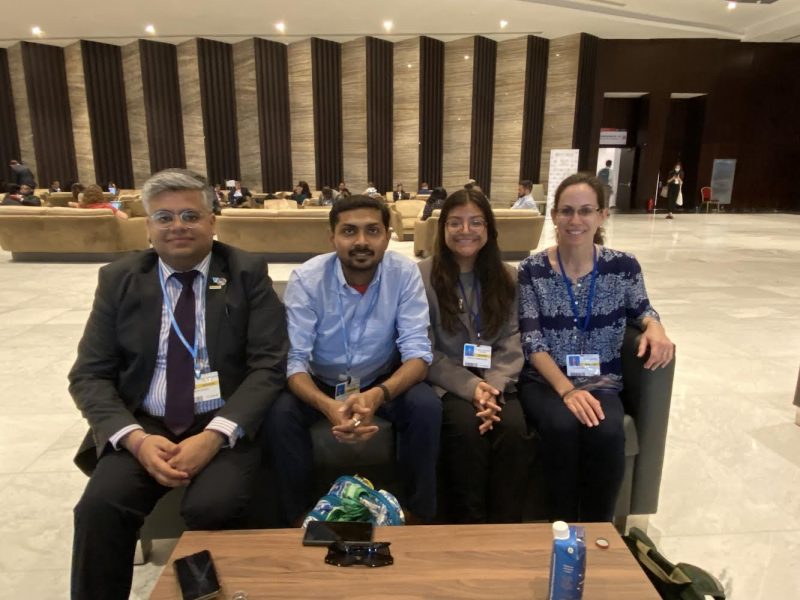
Since I am attending week 2 of COP27 I will be acting as the social media liaison for Michigan Tech as well as acting as a moderator for a capacity hub event that aligned with my previously stated interests. As part of my social media responsibility, I will be posting highlights of the conference on MTU’s Snapchat, recording my journey to Sharm El Sheikh, as well as interviewing students about their experiences at the conference. The panel I helped moderate invited four speakers from diverse backgrounds to come together to speak on how to utilize local/indigenous knowledge to help inform climate science. Using their expertise, recommendations, and ways of living we can influence and utilize generations of knowledge that have long been ignored by policymakers.
This post was written by Kathy Huerta Sanchez, who is attending COP 27 as part of a delegation led by Sarah Green and the Youth Environmental Alliance in Higher Education (YEAH) Network. YEAH is a transdisciplinary, multi-institutional network that equips students with real-world experience of collaborative, evidence-based approaches to global environmental sustainability. Zach is among more than 35,000 attendees at the 27th Conference of the Parties to the United Nations Framework Convention on Climate Change (UNFCCC COP27). The annual summit is the largest climate-change-focused event in the world. He is an Environmental & Energy Policy graduate student at Michigan Technological University.
I am very excited to be a part of a group of Michigan Technological University students attending the United Nations COP27. In my mind, and for many other young people, I view these historic negotiations for younger generations to work towards sustainable development that will create a more equitable future for all.

Different Perspectives From Different Regions
Throughout the semester, all of the students in the course Climate Science and Policy have been studying these negotiations – including the history of climate policymaking and how the different institutions function. As well, we have been learning about how science is used to make decisions and adapt at the global level. Personally, I am excited to be traveling from the Great Lakes region, a relatively remote area, to represent the region where we live and study on the global stage.
This perspective also reminds me that all these other scientists and policymakers are traveling from different places. Each with unique ecosystems and visions for the future. This aspect of different communities traveling from all over the world is exciting to see how differently we will perceive the events and Sharm El-Sheikh Egypt, as a whole. Traveling from the Great Lakes region, which contains 20% of the world’s freshwater resources and vast forest systems, the lands will be very different from where we live, and an opportunity to return with a greater appreciation for the global importance of where we live and steward.
Amplifying the Diversity of Knowledge to Create an Equitable Future
I am looking forward to meeting other people and learning about the lands they come from, and the different ways they conserve and study them. With some fellow students, we will be hosting a capacity-building hub event at COP27. The event amplifys the diversity of knowledge from local peoples to better understand climate adaptation. The panel will describe local knowledge production, its uses, and how it can be implemented. Then this will transition to open the event to participants from COP27 to provide insights into how local knowledge should and has informed climate adaptation.
This is the main focus of why I wanted to travel to COP27 – to learn from as many people as possible about building equitable and resilient futures, and share with others the work we are doing in the Great Lakes. I am hoping to build momentum for those working on community-level adaptation that can empower other organizations to work strategically and contextually.
This post was written by Zach Hough Solomon, who is attending COP 27 as part of a delegation led by Sarah Green and the Youth Environmental Alliance in Higher Education (YEAH) Network. YEAH is a transdisciplinary, multi-institutional network that equips students with real-world experience of collaborative, evidence-based approaches to global environmental sustainability. Zach is among more than 35,000 attendees at the 27th Conference of the Parties to the United Nations Framework Convention on Climate Change (UNFCCC COP27). The annual summit is the largest climate-change-focused event in the world. He is an Environmental & Energy Policy graduate student at Michigan Technological University.
Ever since the first Conference of Parties (COP) was initiated in Berlin in 1995, COPs have been used to review what the signatory Parties (the countries who have signed up) have achieved, and measure their progress. These annual conferences organized by the United Nations Framework Convention on Climate Change (UNFCCC) are the sites for negotiations, discussions, and abating challenges.

Global Crises Impact COP 27
This year (2022) COP 27 in Egypt takes place amidst the backdrop of a multitude of global crises (Cogswell, et al. 2022). We could expect this COP to be an active heated discussion ground that might witness renewed discussion on the pledges made at 2021’s climate conference which had recognized the interlinked global crisis of climate change and biodiversity loss.
The ripple effects of COVID – 19 had not subsided completely when the Ukraine war roared on the horizon which has caused double impact on already impoverished economies. Food, fuel and overall energy prices have skyrocketed, thanks to profiteering of the crisis by the Oil Producing and Exporting Countries (OPEC), mainly Saudi Arabia (Bland 2022). A climate catastrophe in Pakistan claimed more than 1000 lives and displaced millions (Chaudhary 2022).
The first half of 2022 also saw floods and storms in southern Africa that disrupted economic activity and claimed hundreds of lives. China was similarly battered by a drought that derailed the nation’s food and energy production, and Europe is bracing itself for a cold winter after facing the onslaught of the worst drought in 500 years (BBC 2022). Crises does not differentiate between developed, developing or least developed countries. However, the impacts of natural and/or man-made crises is compounded by existing economic disparity, a weak public safety net and deteriorating food systems.
The Parties Must Come Together
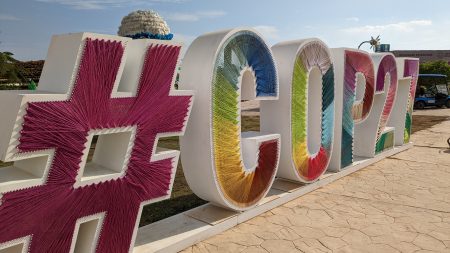
It is thus required from this year’s climate conference that Parties come together to navigate such crises. It is high time that we recognize how our ecosystems have become fragile due to burgeoning unsustainable economic activities. This conference should also be used by the Parties and their delegates to recognize that adaptation, mitigation and GHG reduction strategies now have to extend beyond climate specific activities and be more inclusive of the nexus with food, income, gender, and living.
Millions of people have now been pushed back to poverty for the first time ever. As the current UN Secretary General Antonio Guterres remarked recently, “the world has moved backwards. COVID – 19 and the war has set back more than four years of hard – won progress. Income inequalities have widened as more people fall back into extreme poverty, job losses, along with increasing food and energy prices has set the cycle in backward motion” (Xinhua 2022).
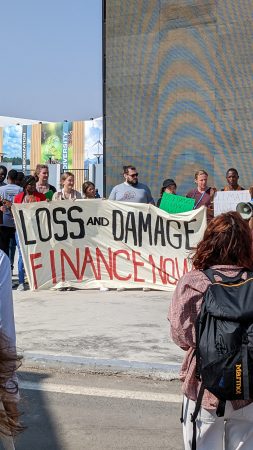
Why I Am in Egypt at COP 27
The intention to participate in the conference was to advocate on my part for the local voices that can speak to adaption strategies, in the context of the National Adaptation Plans (NAP), that are to be finalized by the Parties (UNFCCC 2021). The NAPs were established under the Cancun Adaptation Framework (CAF) which enables Parties to formulate and implement national adaptation strategies as means of identify medium- and long-term adaptation needs. It is a continuous, progressive and iterative process. Through the participation in the Capacity Building Hub organized by the Paris Committee on Capacity Building (PCCB), our objective is to inform climate policy making through local knowledge that has been the wealth of indigenous and other local communities for centuries and how their practices have helped in harboring a sustainable relationship between humans and the ecosystem.
This post was written by Aritra Chakrabarty, who is attending COP 27 as part of a delegation led by Sarah Green and the Youth Environmental Alliance in Higher Education (YEAH) Network. YEAH is a transdisciplinary, multi-institutional network that equips students with real-world experience of collaborative, evidence-based approaches to global environmental sustainability. Aritra is among more than 35,000 attendees at the 27th Conference of the Parties to the United Nations Framework Convention on Climate Change (UNFCCC COP27). The annual summit is the largest climate-change-focused event in the world. He is an Environmental & Energy Policy graduate student at Michigan Technological University.
A dozen Huskies have secured their badges — a golden ticket of sorts — to the 2022 United Nations climate change summit. Held November 6-18 in Sharm el-Sheikh, Egypt, these Huskies will join more than 35,000 participants at the annual gathering known formally as the 27th Conference of the Parties United Nations Framework Convention on Climate Change (UNFCC COP27), or more simply COP27.
Michigan Tech is teaming up with a higher education coalition. “We are part of a larger group, the Youth Environmental Alliance in Higher Education (YEAH). YEAH links multiple universities for engagement with COP,” Michigan Tech professor of chemistry Dr. Sarah Green, also a principal investigator of the Youth Environmental Alliance in Higher Education (YEAH) explained. “Our delegation will be very involved with the U.S. Center, which is where the U.S. government holds events to highlight what our country is contributing to the global effort to limit climate change,” said Green. “YEAH will host a youth panel there on Nov 10th and an exhibit, Voices and Visions, during the whole two weeks of the conference.”
What is it like in the Climate Change Summit Blue Zone? What are they learning? Which world leaders are they interacting with? What are they hearing and experiencing? Read all about Huskies at COP27 here.